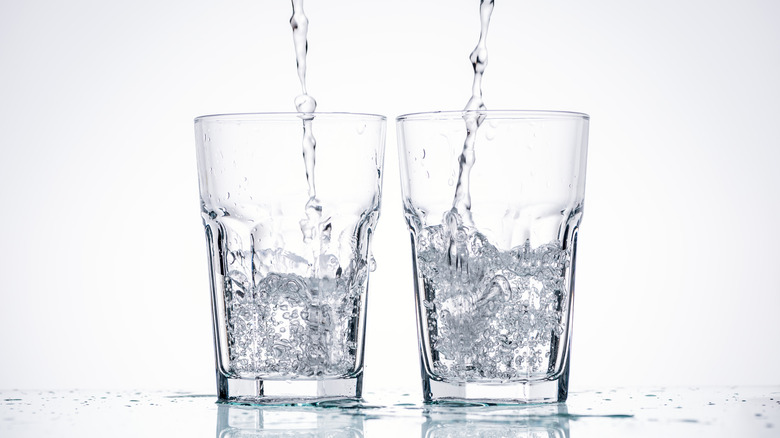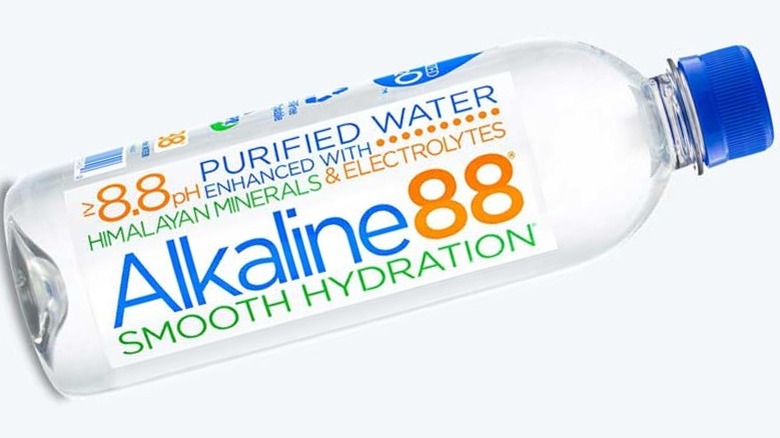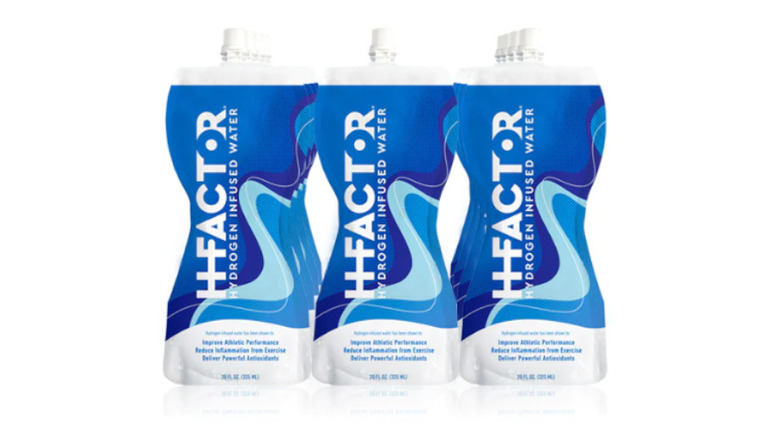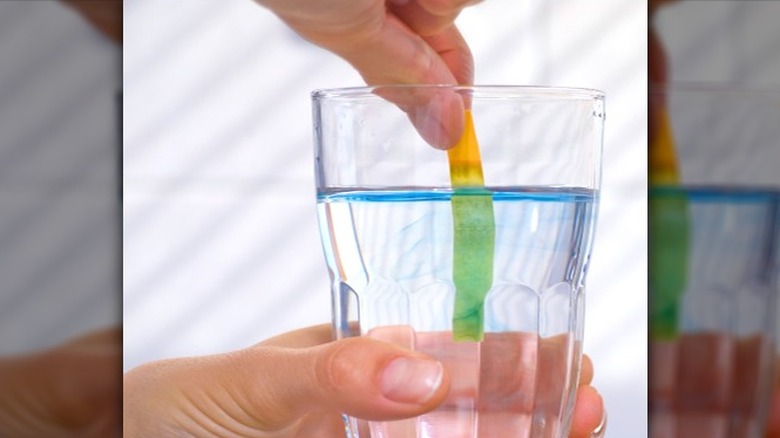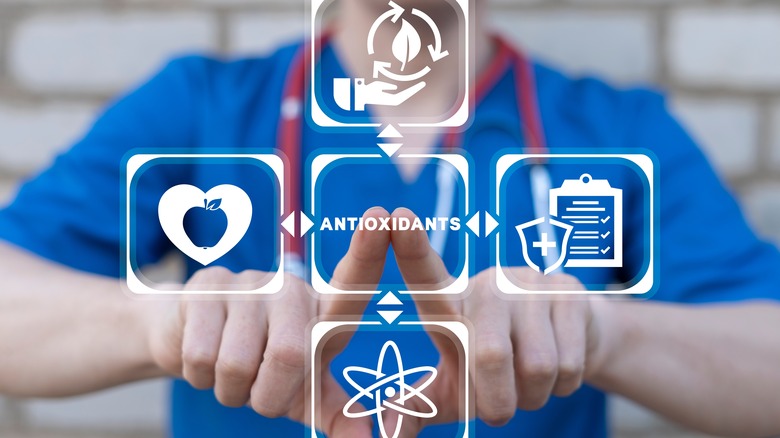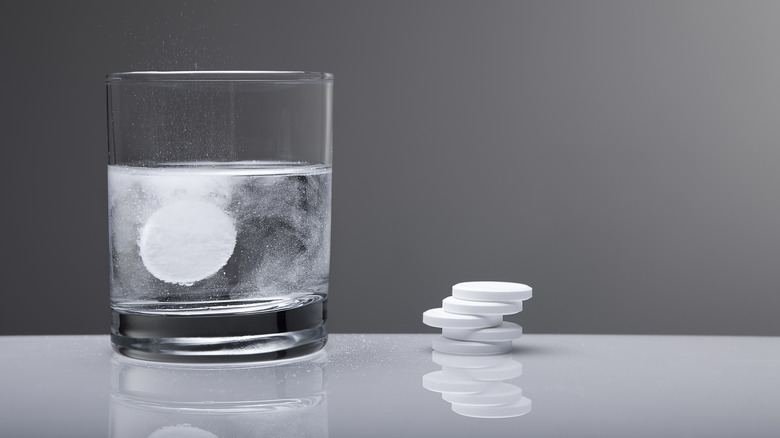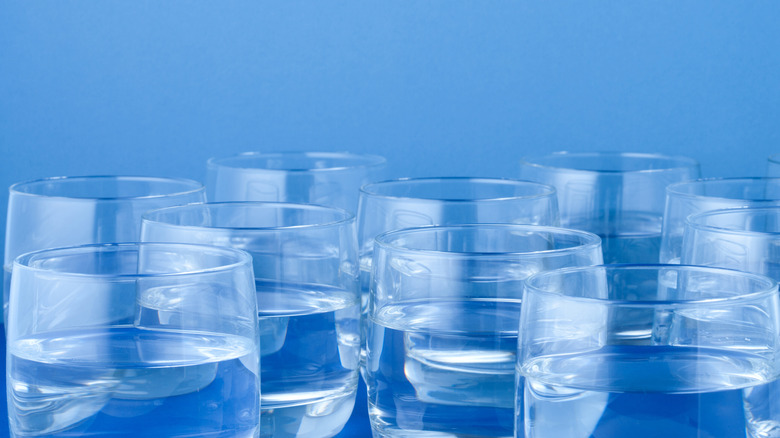Alkaline Vs Hydrogen Water: What's The Difference And Which One Is Healthier For You?
Have you ever felt that regular water just didn't offer enough health benefits? This is the kind of thinking that leads people to discover two relatively new additions to the water market: Alkaline water and hydrogen water. The former has a higher pH than regular bottled or tap water and the latter has been infused with even more hydrogen than water usually contains. But are these things actually beneficial to your body?
Proponents of both alkaline and hydrogen water claim that these products are far superior to tap or spring water, claiming that they have antioxidant and hydrating properties that regular water can't match, and that they can improve your sports performance and overall health. Basically, they're touted as being the best types of water you can buy, but this may all just be a marketing tactic.
In this article, we will explore the differences between the two types of water and take a deep dive into both. We will discuss what they can (and can't) do for you as well as whether or not they are worth their high price tag (spoiler alert — probably not). That way, you can know whether it's time to trade up to a new type of bottled water, or stick with that plain old H₂O you know and love.
What is alkaline water?
Alkaline water, as you might have guessed, is water that's more alkaline (or basic) than regular water, which is usually neutral. This alkalinity is achieved in one of two ways. The first is that the water has been subjected to electrolysis, a process in which an electrical current is used to break water into its acidic and alkaline parts. The alkaline part is then bottled, while the acidic part is not. The second way to make water more alkaline is perhaps the reason that it is said to have so many health benefits. In this scenario, minerals like magnesium, calcium, sodium, and potassium are added to the water to change its pH.
Alkaline water is said to aid in everything from neutralizing acid in the body and increasing hydration to improving bone health and preventing kidney stones. Proponents say that it can delay the effects of aging, improve skin quality, and even cure cancer, so it's no wonder that it gets a lot of hype, even though there isn't much evidence to support the claims.
What is hydrogen water?
If the name "hydrogen water" is confusing to you, you're not alone. As most people know, water already has hydrogen in it: Its chemical formula is H₂O, meaning it has two hydrogen atoms for every one oxygen atom. Hydrogen water, though, has even more hydrogen added, in the form of molecular hydrogen, or H₂. The intention behind this is to make that hydrogen more easily accessible to the cells in our bodies, although the scientific evidence behind this idea is patchy.
Like alkaline water, hydrogen water is purported to have many health benefits. In this case, those include antioxidant properties, as well as decreasing inflammation. It's also said to assist with weight loss and increase one's energy. Some say that hydrogen water can help reduce muscle fatigue during athletic activities and can help improve one's metabolic health as well.
Hydrogen water has no added calories, fat, carbohydrates, or protein, but it may include negligible amounts of minerals like magnesium, potassium, calcium, sodium fluoride, iron, and zinc. These minerals appear in much smaller quantities than they do in alkaline water, making hydrogen water more similar to normal tap water or bottled water in this regard.
Alkaline water has a higher pH
Let's start with a little refresher. The pH of water or other liquids is measured on a scale that ranges from 0 to 14. Zero, in this case, means extremely acidic, and 14 means highly alkaline. The two are polar opposites, and most drinking water falls right in the middle of the scale, at around a seven. This means that it's neutral: It's either acidic nor alkaline. As you have surely already guessed, alkaline water falls closer to the alkaline end of that pH scale, usually around 8 to 10.
This alkalinity is said to help the body become less acidic. For example, it is said to neutralize stomach acid in a safer way than proton pump inhibitors (PPIs) with the addition of a healthy Mediterranean diet. While many of the supposed health benefits of alkaline water are unproven by research, this particular effect was verified by a test tube study carried out 20 years ago, which showed that water with a pH of 8.8 really did affect stomach acid, even if further studies proved that diet avoiding certain foods is more effective at this than both alkaline water and PPIs.
Both are antioxidants
Every day, our bodies generate free radicals, which are byproducts of the process required to turn the food we eat into energy. They can also be created when we breathe in cigarette smoke, exercise, or even just go out in the sunlight. While some quantity of these free radicals is normal, high amounts of them can damage cells or even cause chronic illnesses as they steal electrons from our body, causing oxidative damage. This is where antioxidants come in.
Antioxidants defend the body from free radicals by giving them the electrons they crave, preventing them from having to take any from our body's cells. This means that antioxidants are a great thing to have! Alkaline water and hydrogen water are both said to be antioxidants, but before you run out and buy a bottle of one or both of them, just know that there are plenty of foods rich in antioxidants out there too. Berries, pumpkin, citrus fruits, carrots, parsley, and many other fruits and vegetables are great sources of antioxidants, as are green tea, red wine, and seafood.
You can make your own hydrogen water
Most of the time, hydrogen water can be found in very fancy bottles. If you don't need your bottle to look that fancy (or if you already have your own bottles at home), you can also make hydrogen water yourself. All you have to do is buy a package of hydrogen tablets, which you can simply drop into a glass or pitcher of regular water. Then, voila! You just made hydrogen water.
If even that sounds like too much hassle, you can also buy a special water pitcher that is designed to infuse your water with hydrogen gas with just the press of a button. You can even buy an individual hydrogen water generator that looks like a mini blender, which you can carry with you on the go. Be aware, however, that this convenience and luxury will cost you. Large water hydrogenators often cost hundreds of dollars and hydrogen tablets for drinking water cost upwards of $30 for 30 tablets.
Alkaline water may help with acid reflux
There are a lot of things that people say alkaline water can do, but not much of it is backed up by scientific research. As mentioned previously, however, its effects on stomach acid have actually been proven, but perhaps not to the extent we might hope. Per Harvard Health Publishing, the contents of our stomach are extremely acidic, so unless you were to drink a whole, whole lot of alkaline water, it wouldn't neutralize the acid for very long. Your body would always be working to balance things out, with the stomach acid fighting back and your kidneys working to get the pH of your blood back to normal as well.
When it comes to treating the symptoms of acid reflux, though, alkaline water might actually be able to help. Its basic composition can give you relief if you have heartburn, even if only temporarily. For longer-term relief, you may want to look instead to antacids or medications.
Both are expensive
Now we're getting to the question that was probably at the forefront of your mind: Which type of water is more expensive? We won't beat around the bush — neither alkaline water or hydrogen water is cheap. On many websites and at many stores, 12 bottles of hydrogen water can cost $50 or more. There are also the hydrogen packets we discussed before that could run you $30+ per bottle and the hydrogen-infusing water pitchers that can cost as much as something more practical like a stove. Alkaline water is similarly expensive, with a package of nine 20-ounce bottles costing between $25 and $30.
Some say that the price of these "fancy waters" can be tied, not just to the fact that they are supposedly beneficial to your health, but because they are "trendy." It would be a good idea to do your research on both types of water, however, before deciding whether that hefty price tag is worth it.
Hydrogen water may reduce inflammation
Due to its status as an antioxidant, hydrogen water may also help lower inflammation in the body. While alkaline water is said to be an antioxidant as well, hydrogen water's effects on chronic inflammation have been scientifically proven. A moderately-sized 2020 study published in the journal Scientific Reports, for instance, had participants drink 1.5 liters of hydrogen water every day for a month. After that, it was shown that they had higher levels of antioxidants in the body as well as a lowered inflammatory response than participants who drank regular water.
A different, longer-term study in the journal Diabetes, Metabolic Syndrome and Obesity also saw lower levels of inflammation in people with metabolic syndrome when they drank hydrogen water every day for 24 weeks; metabolic syndrome is a group of medical conditions like high blood pressure or blood sugar, high triglycerides, low levels of HDL or "good" cholesterol, or obesity, all of which increase the risk of diabetes. More studies need to be conducted, but for the moment this is one area in which hydrogen water does appear to provide benefits.
Alkaline water can cause problems for those taking PPIs
While it is true that alkaline water may bring temporary relief to those suffering from heartburn, it should not be used in conjunction with proton pump inhibitors, also known as PPIs. These are designed to lower the production of acid in the stomach, but if alkaline is added to the mix, the pH of your stomach, as well as your blood, can become too high. High blood pH can lead to abnormal levels of potassium and other chemicals in the body, and the effect is particularly problematic if the person in question also has a kidney disease. Normally, our kidneys and lungs work to keep the pH of our blood and bodies balanced, but they struggle to do this if there's already an underlying problem.
Alkaline water can also affect the absorption of other medications. If the pH of your stomach is on the higher end of the scale, this leads to quicker absorption of acidic medicines and slower absorption of alkaline ones, which can be dangerous for your health.
Neither is necessarily better for your heath
While hydrogen water appears to be the winner in its potential for verifiable health benefits, neither it nor alkaline water have been subjected to enough research studies to definitively prove that either of them is worth incorporating into your diet. Theoretically, hydrogen water can help neutralize free radicals, but the amount necessary to do this is still a big question mark. In the trials that have been conducted thus far, hydrogen water really did seem to have the antioxidant effects that it claims to have, but these studies were too small to be considered the final answer on the topic.
Still, though, the only real difference between hydrogen water and regular water is that it has more hydrogen in it. As far as scientists know so far, drinking it won't hurt you even if it may not help you. The same can't be said for alkaline water, which is not only unnecessary, as the body does a great job of maintaining proper pH on its own, but can actively harm you. As we mentioned earlier, it can change the way your body absorbs medication and can be especially tough on those with kidney problems. For this reason, neither alkaline nor hydrogen water is healthier than the other, necessarily, but hydrogen water may be safer.
Both are hydrating
While the benefits of both alkaline and hydrogen water are debatable (and largely a marketing strategy), there is one thing that they have in common. Being water, both are very good at providing you with the necessary hydration to get through your day. According to the Mayo Clinic, men are recommended to take in around 15½ cups (3.7 liters) of fluids each day, 20% of which comes from food, while women need around 11½ cups (2.7 liters) of fluid.
Hydrogen and alkaline water can help you to reach that threshold, drinking enough water for healthy hydration, but they're not exactly necessary. You can get the same amount of hydration at a much lower cost by drinking regular bottled water or even tap water. These two so-called "wellness waters" are probably a healthier choice than, say, a sugary soda, but at the end of the day, the only real, proven benefit you will get from them is that you won't be thirsty.
